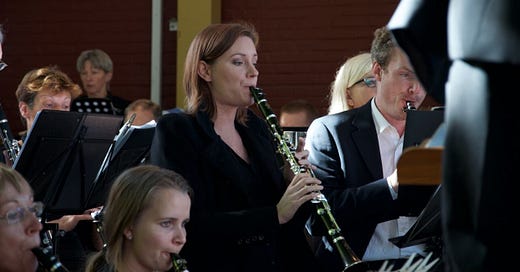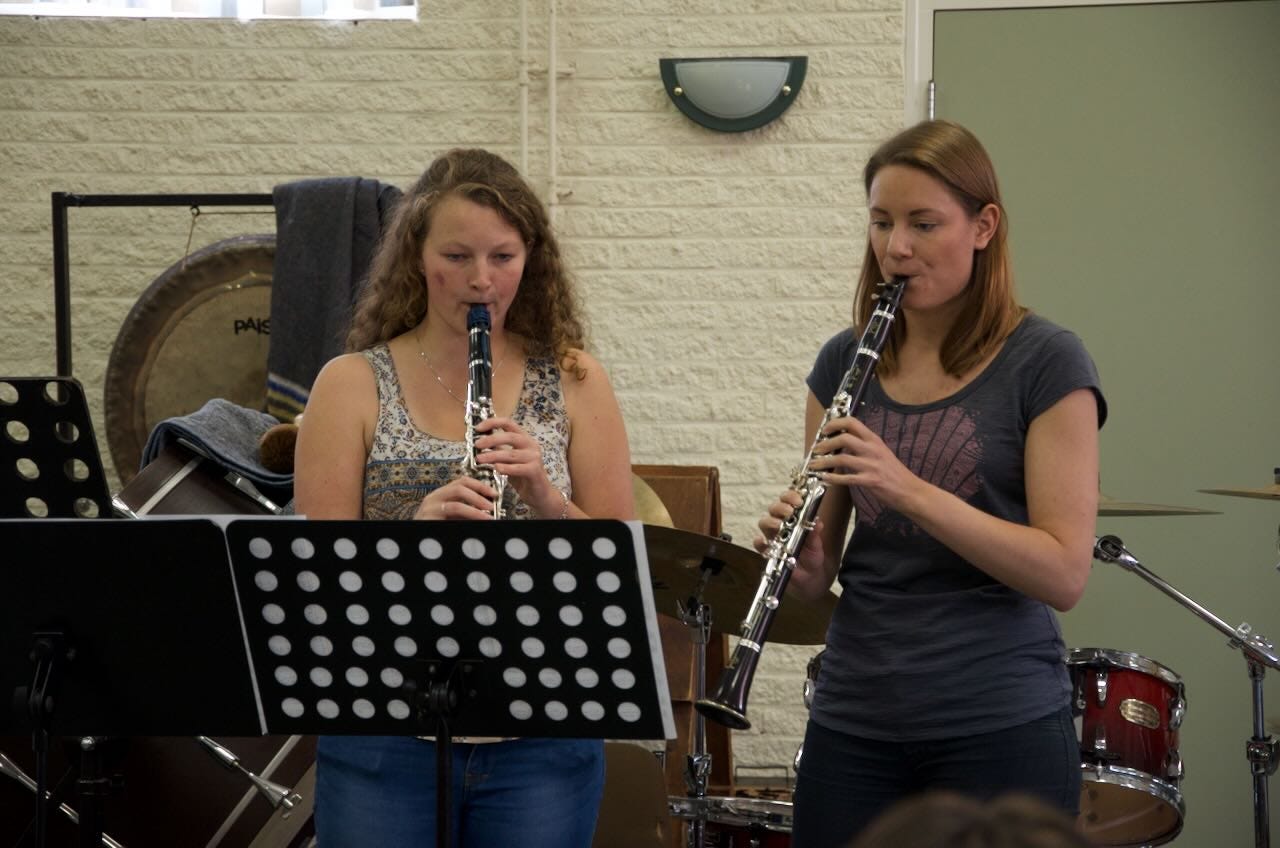Playing in an orchestra shaped my life
Being part of a music society is beneficial in many ways, am I the last generation to benefit from this?
I'm writing this piece as a demonstration of the important things in life. I feel like, as society, we got it all backwards nowadays. We focus on efficiency, making money, taking the easy way, instant gratification. There is something that is the exact opposite of all these things: the arts.
My art of choice is playing a musical instrument. You cannot get good at playing an instrument in an efficient manner, it's a journey with ups and downs. Forget about earning money with it, that takes away a lot of the joy because then you have to play the capitalist game again. You cannot take the easy way with learning to play, it takes years of practice to be able to play really well. That also means there is no instant gratification.
I am so glad that when I was a kid there were no smartphones. I think I definitely would have quit playing the clarinet. I started playing when I was 9 years old, even though I learned to read notes when I was 6 years old and I started playing the recorder when I was 7. I am eternally grateful for my parents' decision to enroll me in the extracurricular music lessons at that early age.
We lived in a small village with 3000 people. But that village had something that was (is?) very common in the Netherlands: een muziekvereniging (a music society) and a good one too! The main orchestra had about 60 members, there was a youth orchestra with about 25 kids and a marching band with about 20 members. Every year they organized an intro evening for kids who wanted to learn to play a musical instrument to join the orchestra. When I was in that second year of basic music lessons my parents took me there so I could choose which instrument I wanted to play. I wanted to play the saxophone, but they already had to many people playing that instrument so they told me "you should play the clarinet, that is similar".
I didn't grow up poor at all, but my parents weren't swimming in money either. Clarinet lessons were expensive and I fear that I am one of the last generations to have profited from local government subsidies. The music society received grants from the local government to spend on music lessons for their members under 18. With this construction, my parents only had to pay 50% of the lesson costs! Thanks to the right-wing government that my country has had over the last 10+ years, those cultural subsidies have all been scrapped. Culture doesn't really have a capitalist purpose, you see. I fear that many kids nowadays cannot get music lessons, simply because it's so expensive.
That's a shame because being a member of the music society from such a young age has shaped my life until the current day in extremely important ways. Ways that cannot be measured with money.
I started in the youth orchestra at age 10 after 1 year of clarinet lessons. This was amazing, making music with the other kids! It was extremely motivating to be part of a bigger whole and learn that every member of the orchestra matters and (literally) has a role to play. These days, if music societies even have a youth orchestra, there's only a handful of kids in them at best. In my days (the nineties) it consisted of almost 30 kids!
When I joined the main orchestra at age 15, I was amazed all over again. During this time, at the height of puberty, I thought about quitting. Playing the clarinet seemed like a silly hobby and I had outgrown the youth orchestra. In retrospect I joined the main orchestra at just the right time. Everyone was so much better than me and I had a lot of new stuff to learn. This was a new motivational moment and I started practicing a lot more. It was also a whole new world, playing with the adults.
Being a member of music society partly saved my mental health at the time. I had a tough time in high school, battling with depression and typical teenage fears (what is my role in the world, what should I do with my life. Ngl, still feeling those fears sometimes). Going to the orchestra week after week was a comfort. At least when I was playing my clarinet there I knew that I was doing something worthwhile. It was my weekly escape from the real world. I was so proud when the principal clarinet player noticed that my playing had improved greatly and complimented me. It is a great feeling to feel that you matter.
Running a music society is a lot of work and it's all done by volunteers. The community aspect of it cannot be understated. There's a board that is responsible for running the whole thing, but on top of that lots of volunteers are needed for all sorts of tasks: setting up the chairs, copying sheet music, making posts for concerts, making coffee for break time, etc. It's nice to do stuff for other people, for free, without wanting anything in return. It's the closest I've come to altruism, I feel.
I am still a member of a music society to this day and I plan to keep it that way until I can no longer physically play the clarinet. I fear that I am one of the last generations to have enjoyed this cultural phenomenon. As there are very few kids being enrolled in music lessons these days, and even fewer kids who keep playing their instrument long enough because the vices of modern life (instant gratification) win, soon enough there will be a time when we will have no new members and the music societies will die out. I'm not making this up, it's already a problem for many of them. Some are solving this problem by fusing with another society, but this only proves that this phenomenon is in trouble. I hope I am wrong, of course.
I think this form of art is the perfect antidote to living in a capitalist world. It's not about money, it's about people. It's not about efficient, it's about effort. It’s not about individuals, it’s about the group. My orchestra is currently preparing for what we call "een concours1", we will play two musical pieces and be scored by a jury. This is another strange phenomenon that doesn't make sense on a superficial level (how does one judge music, it's subjective!), but it's a thing that's completely normal for me. We are studying the two musical pieces for months on end, it requires patience from all the people involved and it requires a lot of time.
Over the last weeks, I have had three extra rehearsals on top of the normal rehearsals. It's amazing to find out what you are capable of as an amateur orchestra after months of work. I truly feel so blessed to arrive at my orchestra every time and be with people who also take their hobby very seriously.
And all this because my parents made the fateful decision to enroll me at the basic music lessons and because they received monetary help so they could afford the lessons for me. I mean this from the bottom of my heart: I wish everyone had the opportunity to find out if playing a musical instrument is right for them.
Is what I described here also a thing in your country? Did you experience something like this? Let me know!
it’s a competition. Every orchestra is judged on many musical aspects and then given a score. 80+ points = 2nd place. 90+ points = 1st place. There is also the daily winner, that is the orchestra that scored the highest points that day. If you get a 1st place, you can advance to the next stage. That means: playing more difficult music, so it’s harder to get a high total.






